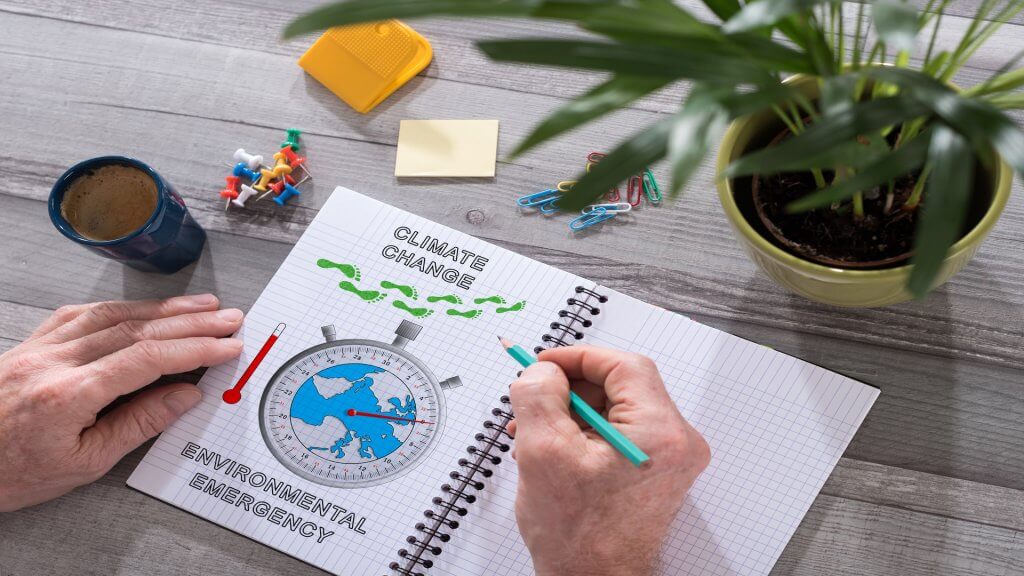Print and design experts Solopress have investigated the intentions of UK businesses as we go into 2022.
- A total of 49 countries plus the EU have pledged a net-zero target, covering over half of global domestic greenhouse gas emissions, over half of GDP and a third of the global population.
- The UK has a legally binding net-zero target by 2050 and new interim targets to reduce emissions by 78% by 2035.
- Following COP26, a staggering 90% of world GDP is now covered by net-zero commitments, with 153 countries putting forward new 2030 emissions targets (NDCs), these cover around 80% of the world’s greenhouse gas emissions.
- 85% of businesses surveyed by Solopress say that sustainability is currently a priority.
- “Sustainable, resilient operations” will be the number one biggest business trend for 2022 according to Forbes.
- 79% of businesses say that they consider sustainability when looking at their marketing activity.
- 87% said that they are planning to focus more on sustainability when it comes to their future marketing activity.
- The UN projects greenhouse gas emissions is expected to be 5 billion tonnes lower by 2030 as a result of the revised targets.
The Impact of COP26
Before COP26, a total of 49 countries plus the EU pledged a net-zero target, covering over half of global domestic greenhouse gas emissions, over half of GDP and a third of the global population. The UK currently has a legally binding net-zero target by 2050 and new interim targets to reduce emissions by 78% by 2035.
COP26 was the largest COP to date, with 120 world leaders and 50,000 registered delegates gathering to address the climate crisis. The 2021 Glasgow Climate Pact initiated several actions that could fast-track vital emissions reductions by 2030 and reduce global climate damage.
Following COP26, a staggering 90% of world GDP is now covered by net-zero commitments, with 153 countries putting forward new 2030 emissions targets (NDCs), these cover around 80% of the world’s greenhouse gas emissions. The UN projected greenhouse gas emissions are expected to be 5 billion tonnes lower by 2030 as a result of these revised targets.
The increasing pressure to address climate risk was also demonstrated with 100 countries committing to reduce global methane emissions by 30% by 2030. Additionally, 80 countries have committed to implementing either Adaptation Communications or National Adaptation Plans to manage preparedness for the consequences of climate change, with 45 plans submitted over the last year. These new processes and the new requirement for UK companies to report their climate action from 2022 have forced UK businesses of all sizes to prioritise sustainability when it comes to corporate social responsibility.
UK Businesses and Sustainability
According to NatWest findings, almost two-thirds of companies in Britain already invest in corporate social responsibility programmes, with 64% of midsized businesses promising to practice ethical behaviour through corporate social responsibility. The research also revealed that more than half of midsized businesses in Britain claim that sustainability is “extremely” or “very” influential in their decision-making process.
A significant recruitment drive for CSR based roles is also evident throughout the UK with CSR job vacancies increasing by 74% since 2020, with 28% pertaining to senior roles.
Interestingly, a 2021 survey conducted by Solopress, representative of micro-businesses (34%) small businesses (51%), medium businesses (9%) and large businesses (6%) showed that 85% of UK-based businesses say that sustainability is a priority for them, further demonstrating the heightened national focus on combatting the climate crisis.
2022: A Shift Towards Sustainable Marketing
According to The Next Scoop, sustainable marketing plays a significant role in helping businesses fulfil their sustainability targets. Not to be confused with green marketing, which is solely concerned with production processes and their eco-friendly features, sustainable marketing is rooted in environmental, social and economic issues incorporating everything from green marketing materials to messaging that shares a company’s CSR work.
Solopress findings from November 2021 reveal that 79% of surveyed UK business representatives say that they consider sustainability while carrying out current marketing activity. 87% however, said that they are planning to focus more on sustainability when it comes to future marketing activity, evidencing a rapidly growing trend for 2022. As businesses look to adapt their approach and meet challenging net-zero targets in the coming years, sustainable marketing practices must become a key consideration.
Creating a Sustainability Strategy for 2022
Although a switch to sustainable marketing is going to be unavoidable as businesses push to fulfil their green agendas in 2022, it’s vital that this is executed correctly and that any hint of ‘greenwashing’ is avoided.
Greenwashing is the act of making misleading environmental claims about your business, which is not only harmful to your business reputation but can also lead to litigation. In the case of Shell for instance, the fuel company Tweeted in 2020 saying “What are you willing to do to reduce emissions? #EnergyDebate” to which United States Democrat politician Alexandria Ocasio-Cortez responded by exposing the brand for knowing about the dangers of fossil fuel emissions since 1990 and lying about it whilst shifting the responsibility to individual consumers.
In light of this, Solopress have outlined five top tips to developing a successful sustainable marketing strategy for 2022 and beyond. The brand is a member of Two Sides, a not-for-profit group that’s able to investigate, educate and communicate when it comes to the ecological issues surrounding paper and print and who actively combat greenwashing.
1. Re-Evaluate Your Corporate Values
Focusing on how your corporate values may or may not align with the global goal of reducing emissions is hugely important when it comes to adapting your marketing strategy. Research from B2B Marketing shows that 69% of consumers say they will endorse a brand if they show they are acting on their values, therefore revising these values to incorporate environmental and social responsibility is the best possible starting point for developing a sustainable marketing strategy. This shift ensures all communications around sustainable practice and policies are authentic.
2. Invest in Sustainable, Recyclable Marketing Materials
As consumers expect brands to care about sustainability the same way that they do, utilising eco-friendly marketing materials is hugely important in building that trust and brand equity, whilst fulfilling the pledge to reduce emissions. Opting for recyclable promotional materials helps to reinforce your sustainable identity according to Custom Planet. Offering the Solopress Green range that utilises recycled paper stocks certified by the Forest Stewardship Council, Solopress authentically support the global green agenda. Additionally, the brand’s work with environmental consultant ClimatePartner ensures that all emissions are offset through investments in projects in both Europe and the Amazon that reduce carbon pollution, ensuring a greater contribution to a greener future.
3. Emphasise Green Selling Points
Highlighting green USPs such as environmental accreditations is a simple way to position yourself as a brand that’s determined to make a difference. However, it’s crucial these propositions don’t appear contradictory as highlighted in the case of Starbucks. In 2018 the brand released a “straw-less lid,” as part of its sustainability drive, however, the lid contained more plastic than the previous lid and straw combination. A great example of a brand leveraging green selling points in an honest, authentic way is Patagonia, as they promote their green credentials while remaining transparent about the fact that they still have some way to go, acknowledging the use of fossil fuels in the shell of their coats.
4. Support Green Initiatives
Giving back to the local community by supporting green initiatives is instrumental in positioning your brand as one that is truly invested in tackling the climate crisis. This could be achieved by raising money and donating to environmental initiatives as a company. These efforts can then be leveraged throughout marketing communications to showcase positive contributions for the community and planet.
5. Educational messaging
Marketing activity that provides value such as compelling statistics, or tips on how to live more sustainability such as social media content can not only enhance a brand’s online presence but also amplify important, newsworthy environmental messaging which speaks to the values and intentions of the company sharing them. Again, this content must be aligned with the brand’s values and products/services to ensure that greenwashing is avoided.
Above all else, honesty and authenticity must come first when it comes to delivering a sustainable marketing strategy. Customers are becoming increasingly aware of brands attempting to “greenwash” and therefore sharing false claims or claims that contradict any aspect of your brand’s business proposition could have huge repercussions in terms of brand equity. As we look to 2022, it’s an undeniable fact that sustainability must be prioritised to ensure both the success of a business and the preservation of our planet.






























